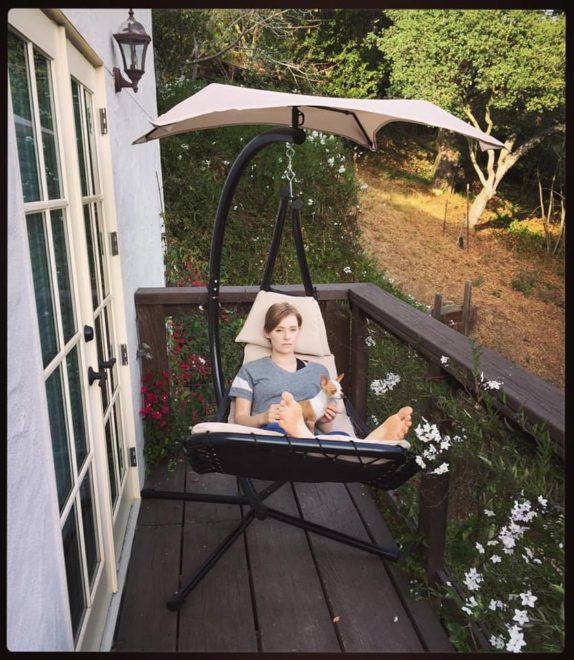My Mental Health Balancing Act with Type 1 Diabetes
Being diagnosed with type 1 during my sophomore year of high school was brutal in many ways, and only added to the depth of my issues with anxiety that were already in place. As far back as I can remember, I had always had social anxiety. I could never seem to connect with my peers.
Having a father who has always been in the Major League Baseball industry, I was always traveling, and was constantly around adults. I grew up a bit quicker than I should have, I suppose. Which, in turn, gave me a certain level of independence and maturity that proved very useful when I was diagnosed with type 1.
The first couple of months with type 1 were surprisingly okay. I was taught by wonderful diabetes educators and doctors at Phoenix Children’s Hospital, and I felt confident that I could handle it like a pro. I calculated my carb ratio with whatever I was eating, gave myself my Novolog, (along with my Lantus in the evenings) and I was good to go. My honeymoon stage aided in my consistently great blood sugars. I would go to the nurse’s office at my school every day right before lunchtime and take my blood sugar and give myself my insulin with the other people with type 1 diabetes at my school. (There were about six of us.) I definitely felt supported.

I still remember the day that my diabetes anxiety finally reared its ugly head. I was sitting in my English class and I suddenly felt dizzy and disoriented. I normally kept my blood sugar meter in the nurse’s office, but luckily I had a spare in my bag. I discreetly checked myself under my desk. I wasn’t dangerously low, but I was in the low 80s. I breathed a sigh of relief, but asked to be excused to the nurse’s office.
For some reason that day—all of the complications and potential future lows, highs and other related emergencies came flooding into my head. What if I had a severe low and my mom was not with me? What if I accidentally took too much insulin? What if my pen malfunctions? Can my pen malfunction?! What if my peers at school saw me pass out? What if I just completely lose control?
All of these “What ifs” continued to haunt me through my late teens and early twenties. My A1C rose progressively as I purposely kept myself higher in fear of going low. I knew that I was on a bad road, and had to get a handle on it somehow, but how? My anxiety and my fears were unrelenting. Always there in the back of my head.
I began to hear things about the Dexcom. I waited awhile until I felt that the system had been perfected, and finally got one. It was amazing to know what was going on inside my body with my blood sugar levels—especially when I was alone or asleep at night. But while it did give me peace of mind in some respects, it stressed me out on other occasions. I found myself getting even more paranoid and obsessive about my blood sugars. It was truly a love/hate relationship with Mr. Dexcom.
After traveling back and forth between New York City and Los Angeles for school and work, something inside me told me to take a rest and go back to the Bay Area where my family was—in the beautiful hills of Berkeley. I consciously decided to find my spirituality and peace of mind. I knew that this was the only way I could relieve my diabetes anxiety. Or at least it was worth a shot!
Here are some things that I’ve discovered on my path to enlightenment that have helped me overcome stress, anxiety and fears—both in relation to type 1, and in life as a whole.
Have a routine but also have fun!
I enjoy routine, but I also enjoy spontaneity and adventure. You might wonder how one person could have both of these lifestyles simultaneously.
For me, knowing what foods jive with my body and what levels of physical exertion will do to my blood sugar is key to getting the most out of my days—whether it be relaxing at home OR traveling somewhere exciting.
Wake up—have some eggs and perhaps a high fiber piece of toast or bacon—do yoga or go on a hike—run errands—high protein lunch—shower—get to my writing projects—make dinner. This is an example of my routine at home. However, if I am traveling or if I want to plan a day out and about, I adjust as needed. I still incorporate the foods that I need into my diet, and conserve or exert my energy on my terms. If I need a rest, I rest!
Which brings me to….
Utilize your tools, but trust your body.
We are very lucky that in this day and age, we have access to many tools that help us manage our type 1 diabetes (T1D) more easily. But as I mentioned from my experience—some of us have a love/hate thing going on with them. Dexcoms can feel nagging. Pumps can make us feel a bit less freedom in a sense. But at the same time, they are our best friends.
What works for me is occasionally taking a break from my Dexcom. Not too long—just a day or two to get back in sync with my own body. It is important not to lose touch with its own natural cues to when something is wrong and when you feel at your best. When I am wearing it, if it is giving me more anxiety than usual, I occasionally turn off the “fall rate” alert, so that I don’t overreact and start correcting a low that hasn’t even happened yet. Of course, this isn’t always recommended. I always keep the alert on when I am sleeping or exercising!
Keep your thoughts in the present.
“Live in the moment” has become a bit of a cliché saying these days, so I thought I’d word it differently. It is truly important to focus on life as it comes to us. I used to worry myself sick over possible lows or highs I might have after eating or doing certain things on the horizon. BUT—what good is it doing to worry in this moment about getting low if I’m not low? It seems like a simple concept, and it should be. If a blood sugar issue happens, we deal with it as best as we can from minute to minute. The best part is—it will end.
Embrace your inner child.
Don’t forget about the part of you that just wants to be a kid again—to play!
Take the time to do the things that make your heart smile—the things you loved to do as a child—the things that allow you to express yourself in your truest form. Whether it be writing, painting, running, playing an instrument, being in nature, or going to Disneyland! We as type 1 diabetics deal with a lot of “heavy” stuff daily, so never deny yourself those things. There is always time, and it brings enormous peace and satisfaction. And with peace comes better A1Cs.
Be independent, but have a support system.
I remember embracing my responsibilities very early on after being diagnosed. I was encouraged by both my doctors and my parents to learn exactly how to manage things on my own without any help, and I did. Very rarely did my parents ever have to check to make sure I was doing what I needed to be doing —checking my blood sugar or giving myself the correct amount of insulin. But at the same time I knew that they were there. If I ever had a question or doubted myself, I was supported.
One of my best friends Sarah was diagnosed with T1D exactly one year after I was. We went through it together, and I am incredibly grateful. We handle things very differently at times, but it provides for a unique perspective and it is comforting to know that not everyone deals with their type 1 the same way. It’s lovely to connect with others with type 1 and learn from them, as they will learn from you.
Experiment.
I was never into cooking before I was diagnosed. But once I started to research nutrition out of necessity, I was hooked and intrigued! I started to experiment with lower carb alternatives. Not to say that I deny myself, but I enjoy being healthy and I enjoy less blood sugar spikes. Now I cook regularly, and I find it to be a creative outlet in addition to a way to get my daily fuel. I also actively seek out new, organic foods to try that will make me feel most energized and I take note of how my blood sugar reacts.
Allow yourself to heal.
Don’t be so hard on yourself. Dealing with any disease takes a toll on our sanity, and understandably so. I try not to judge my emotions as they arise. Breathe, acknowledge them and then exhale. Perhaps they’ll stick with you for awhile longer, or perhaps they will leave you. Either way, just let yourself heal.
Ever since I moved to Berkeley, I have been studying various forms of healing on a spiritual level. The common denominator with all of them is balance.
Life is a balancing act, T1D or no T1D. All of these things have helped me exponentially to overcome my anxiety—and I continue to discover more as I—in turn—discover more of myself. As will you!
More from Alexi: The History of Type 1: Where We’ve Been and Where We’re Going





